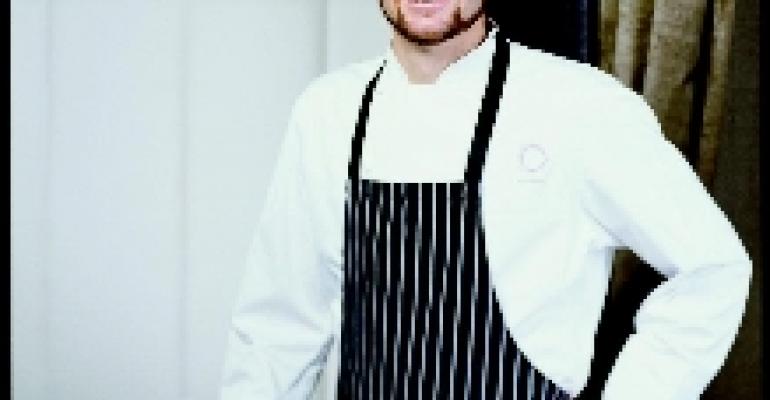 |
| PERSONAL TOUCH: Insisting on top quality, Cimarusti cuts every piece of fish he serves. |
 |
 |
 |
| FINE DINING FLAIR: Providence's lean and modern Melrose Avenue space, the former home of Patina, is brought to life by artful takes on seafood. |
PROVIDENCE, A SEAFOOD RESTAURANT IN A LEAGUE WITH THE FINEST WORLDWIDE, HAS SET SAIL IN LOS ANGELES. THERE, BARNACLES GRACEFULLY GROW ON WALLS AND LIGHTS REMINISCENT OF AQUATIC LIFE FLOAT ABOVE. CHEF MICHAEL CIMARUSTI-WHO PUT ANOTHER LOS ANGELES SEAFOOD RESTAURANT, WATER GRILL, ON THE MAP-OPENED HIS OWN, MUCH-ANTICIPATED PLACE LAST SUMMER. RH ASKED CIMARUSTI ABOUT HIS VISION FOR PROVIDENCE.
RH: You waited a year before opening the doors of Providence. What took so long?
CIMARUSTI: Just everything...especially getting the lease done. It took a long time to negotiate.
RH: Why did you hold out for this location, instead of finding another?
CIMARUSTI: It has a storied past. It was the original home of Patina and before that, Le St. Germain. The beautiful kitchen would be difficult to build anywhere. This was an opportunity to have a truly gastronomic restaurant. The facility was as important as the concept and the food.
RH: What did you do during your long wait?
CIMARUSTI: I spent some really good time with my kids.
RH: Investors are increasingly necessary for restaurant projects. Who developed backers for Providence?
Cimarusti: Bob Sutcliffe, our attorney, primarily does offerings, bringing investors together for restaurants.
RH: After leading Water Grill to national prominence, why did you leave to open Providence?
Cimarusti: I wanted the opportunity to be on my own, to cook at a different level. Lunch at Water Grill is fast, and dinner service is theatre-driven-people are in at 6:00 and out by 7:00. It's hard to do your very, very best when the ultimate goal is speed.
RH: How did you meet your partner/maitre d' Donato Puto?
Cimarusti: We formed a friendship at Water Grill. He was European trained...advancing through the ranks and mastering set skills at each level. It's pretty rare to find that here. He didn't fall into this business; he is a hospitality professional.
RH: At Providence you feature the freshest fish. Where do you find sources?
Cimarusti: Years of inquiring. It's more about building relationships. The purveyors are very important. You look for people with standards similar to your own for purchasing, handling and storing the fish.
RH: When did this affinity for seafood begin?
Cimarusti: My grandfather taught me how to fish. I fished almost every day at a pond near my house. My father and I would fish each summer in Maine. And my grandmother had Christmas Eve vigil, when Italians eat seven fish, one for each day of creation.
RH: You've hired a high-powered public relations firm. Why?
Cimarusti: To establish the restaurant's name and bring in opinion makers. Also, I'm not terribly comfortable speaking with guests. Usually, I don't go into the dining room. The kitchen is where I want to be.
RH: As your reputation grows, how can you maintain the quality of your work?
Cimarusti: Standards you create are your greatest blessing and biggest curse. Vigilance is ultimately the most important thing. I look at every single piece of fish that comes through the back door and make sure it's what I want; if not, I don't sign for it, I send it back. I cut every piece of fish served in the restaurant. It's a constant battle to be sure all steps in food preparation maintain flavor and integrity. It's so difficult! It's the biggest challenge.
RH: Early in your career, you worked at Le Cirque. How did you end up there?
Cimarusti: I applied and showed an interest. I was very persistent. The chef would say, "Maybe I'll have something for you next week." I went back over and over again. Finally he said, "Okay, you can start Monday."
RH: A visit to Providence is a voyage of the imagination... a cruise where each stop is a fantasy of taste: squid with julienned pig's ear, piquillo pepper, light greens and Marcona almonds. What sets in motion ideas for new dishes?
Cimarusti: I might bounce ideas around with the chef de cuisine, Paul Shoemaker, and a couple of cooks: Are we dissatisfied with a dish? What goes with a certain protein? Gradually, an idea develops. Hopefully, it works on the plate. Seasons and availability really dictate inspiration.
RH: When you have spare time, what do you do?
Cimarusti: Spend it with my wife and kids. And I like to go fishing.





